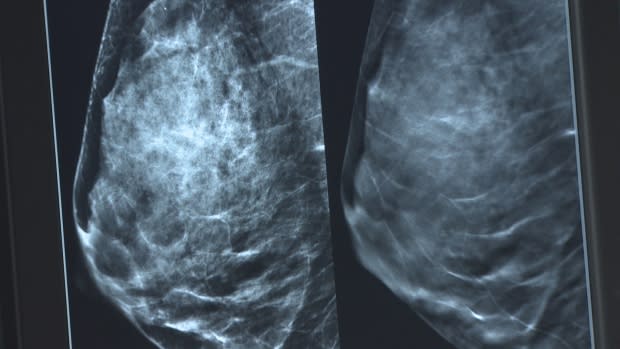Health PEI should tell women if they have dense breasts, says advocacy group
An advocacy group called Dense Breasts Canada says Health PEI should be telling Island women about their breast density.
In a mammogram, cancer can be harder to see in women with dense breasts. While fatty tissue appears as dark grey in a mammogram, dense tissue shows up as mostly white — just like cancers.
Right now on P.E.I., if a woman has a breast density of more than 75 per cent, she is invited to have a mammogram once a year, as opposed to once every two years — but isn't told the reason behind that increased screening unless she asks her family doctor, or phones to inquire about why she's being screened more frequently.
Other provinces do more, says group
Health PEI is planning a review of the provincial breast cancer screening program within the next year and has said — with regard to breast density — it's been doing exactly the same as any other publicly funded jurisdiction in Canada.
But Jennie Dale, co-founder of Dense Breasts Canada, says that's not the case.

"There are provinces further ahead in recognizing the risks of dense breasts than P.E.I.," said Dale. She said in Quebec, women in the highest category of breast density who also have a family history are being given an ultrasound as a supplementary screening measure — and in Alberta, many clinics are recommending an ultrasound to women in the highest category.
"So for [Health PEI] to lump themselves as doing the same as everybody else is an excuse for not doing what they should be doing," said Dale.
"It's unacceptable," said Dr. Paula Gordon, medical advisor with Dense Breasts Canada.
Gordon takes issue with Health PEI stating that the use of ultrasound technology does not improve rates of cancer detection among women with dense breasts.
Review 'waste of time ... money'
"The first paper that came out showing we could find cancers on ultrasound, that were missed on mammogram, was in 1995," said Gordon, who notes that the first study confirming the higher the density, the higher the risk, was published in 1976.

"This is data we've seen over and over again reproduced by different studies."
Dale also points out that P.E.I. should not limit its definition of dense breasts. "If P.E.I. just wants to recognize women in the 75 per cent [and] over category, then they are ignoring a huge chunk of women."
Over 40 per cent of women, aged 40 to 74, have some degree of dense breast tissue, according to a 2014 U.S. study.
Health PEI has committed to studying the issue of when and how women are told about their breast density, as part of a review of the province's breast cancer screening program. Officials said the group plans to study what other provinces are doing, and how best to move forward.
But Dale said the topic of breast density in relation to cancer screening has been studied for decades already — and believes Health PEI has access to all the information it needs to act immediately.
"We don't need another review to tell us the higher the density the higher the risk," said Dale.
"We don't need another review to tell us about the masking effect of breast density. We don't need another review to tell us that women need to be notified of their breast density. It's a waste of time, a waste of money, it is just a stalling technique."
Social media campaign #tellme
"I'd like them to know that their government is not sharing information with them that they need to know," said Dale.
The group has been using a social media campaign centred on the hashtag #tellme, inviting Canadian women to share their stories — and lobby elected officials to make telling women their breast density a common practice.
"If you go to the doctor and they take your blood pressure, you shouldn't have to ask if it's high. If it's high, you should be told what you can do to reduce your risk," said Gordon.
They plan to roll out the campaign on P.E.I. in the weeks to come.
Health PEI did not respond to requests for further comment on the issue.
More P.E.I. news

